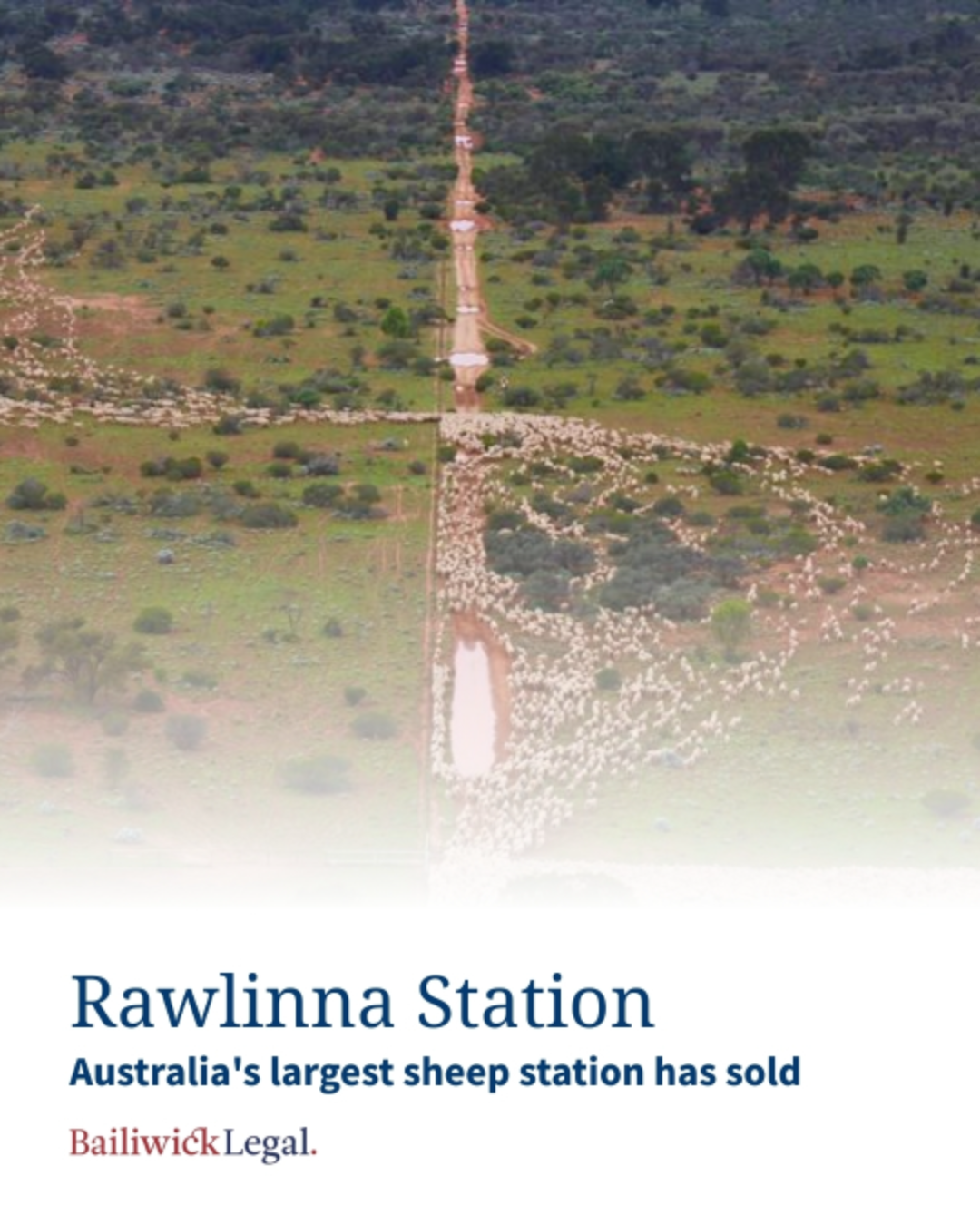20 Years Imprisonment and a $5,000,000 fine!: Industrial Manslaughter and You
February 19, 2026
Author name
Significant changes to Western Australia’s Work Health and Safety laws were passed in November 2020. Although not yet operational *
the changes are coming and every business owner needs to be prepared.
But what does this mean for your family, business and farm? and why is the term “Industrial Manslaughter” getting thrown around?
The Work Health and Safety Bill
In 2011, Safe Work Australia developed a single set of WHS laws to be implemented across Australia, known as the ‘Model‘ Laws. For these Model laws to become binding the Commonwealth, States and Territories must separately implement them as their own laws.
Western Australia has two work safety law regimes, the Occupational Safety and Health Act 1984 (the OSH Act) and the Mines Safety and Inspection Act 1994 (the MSI Act).
The Work Health & Safety Bill 2019 (WA) (the Bill) brings these laws together whilst adopting much of the Model Work Health and Safety laws. The objectives of the Bill is said to provide a balanced and nationally consistent framework to protect the health and safety of workers, improve safety outcomes in workplaces, reduce compliance costs for businesses and to improve efficiency for regulatory agencies.
The Bill also includes other key reforms, such as a prohibition of insurance against fines imposed for a work health and safety offence as well as the introduction of a charge of industrial manslaughter.
Industrial Manslaughter
Previously, the term “industrial accident” was commonly used to describe an incident resulting in death at the workplace. However, this term implied no causality and no culpability, something that, while significant and terrible, indicated no error or reasonability to be assigned.
The government recognises that workplace injuries and deaths are mostly caused by, but not limited to, a combination of factors, including poor system design, bad behaviour as well as poor and improper choices.
The proposed industrial manslaughter laws are split into two different categories, one being a “crime” and the other a “simple offense”. The table below highlights some of the main points and differences.
An offence under the MSI Act and the OSH Act which resulted in a death of an employee would draw a fine of up to $500, 000.
There are few important things to note from the Bill:
1. More than one person can concurrently have the same duty.
2. The duties that apply cover persons conducting businesses or undertakings, officers as well as workers and any person at the workplace.
3. The duties appear quite loosely defined, such as, a duty to take reasonable care that a person’s actions do not adversely affect the health and safety of another person. Neither “reasonable care” nor “adversely affect” is clearly defined, which means it could be open to a number of different interpretations.
4. The test for whether or not a simple offence has been committed involving death at a workplace is simply whether or not a person had a health and safety duty and whether or not the person has failed to comply with that duty. Any knowledge or any mental element is not necessary for the evidentiary threshold to be passed.
Differences compared to Other Jurisdictions
While one of the intentions of the new laws is to bring harmony to work health and safety laws used throughout Australia, the reality is different. For example, in the Northern Territory, the maximum penalty for the offense of Industrial Manslaughter is life imprisonment and $10,205,000 while in Victoria, the maximum fine for a body corporate will be $16,522,000 once its proposed laws come into effect on 1 July 2020.
Additionally, as mentioned above, the Bill provides that an offence will have been committed if an individual, or organisation, has a health and safety duty and simply fails to comply with that duty and subsequently causes the death of an individual.
While jurisdictions like Victoria have proposed laws that consider conduct as negligent only if it involves “a great falling short of the standard of care”, the Bill does not provide for the degree of the failure to comply with a person’s duty before it becomes an offence, just that the duty wasn’t complied with.
One of the health and safety duties imposed on a person with “management or control of a workplace” is to ensure that the means of entering and exiting a workplace and anything arises from the workplace are without risk to health and safety of any person. This appears to set the bar relatively low when it comes to establishing whether or not there is a duty that can be breached. With no definition as to what properly constitutes a failure to comply with that duty, we may be seeing a claim of industrial manslaughter for any cause of death at a workplace.
Where to next with your work health and safety measures?
No two work environments are alike and, after considering all the variable factors and different management styles of different organisations, very few are even similar. Given the potential seriousness of these charges it is essential that every agribusiness from the local farmer to CBH reviews, updates and implements clear safety practices, policies and equipment. Documentation and Inductions will be essential to protect your business and yourself.
*At the time of printing this article the legislation was not operational. Please contact us for an update on this matter.
Disclaimer: This information is of a general nature only and is not intended to be a substitute for specific legal advice. It is recommended that these matters be discussed with your lawyer.

Bailiwick Legal has been honoured to support Forever Wild over the past few years as they delivered one of the most significant conservation land acquisition programs undertaken in Western Australia. Our team assisted Forever Wild with the strategic purchase of four pastoral stations, Narndee , Boodanoo , Meeline and Challa , transactions that now connect three State Reserves and protect more than 12,000 square kilometres of land. To put that scale into perspective, the combined area is approximately five times the size of the ACT and nearly one-fifth the size of Tasmania . Navigating complexity at scale These were not straightforward property transactions. Each acquisition involved: Multiple pastoral leases Layered regulatory and approval pathways Significant operational and on-ground assets Numerous stakeholders across government, industry and land management Our role was to guide Forever Wild through this complexity with clarity, precision and confidence, ensuring each transaction progressed efficiently while managing risk and safeguarding long-term objectives. “ Forever Wild is creating a world-leading model for nature funding that demonstrates we can manage viable, working pastoral stations whilst also restoring and protecting local ecological flora and fauna, and engaging and supporting Indigenous people and local communities. Complex & challenging, but this initiative could literally change the world .” Jessica Brunner - Director, Bailiwick Legal A growing and evolving legal landscape Large-scale conservation acquisitions sit within an emerging and increasingly complex legal field , intersecting land tenure, pastoral regulation, environmental frameworks and commercial considerations. These matters demand a deep understanding of both the legal mechanics and the practical realities of operating in regional and remote Australia. Our team’s experience in agribusiness, pastoral land transactions and regulatory approvals allowed us to support Forever Wild at every stage, from strategic structuring through to completion. Proud to support leadership in nature finance Forever Wild is widely recognised as an industry leader and a steadfast advocate for nature finance initiatives , helping pave the way for greater accessibility and innovation in conservation funding and land stewardship. We are proud to have contributed our relationships, expertise and practical legal insight to help Forever Wild achieve its vision, and to have played a role, however small, in shaping a groundbreaking future for conservation in Australia. At Bailiwick Legal, we value the opportunity to work alongside organisations that are thinking long-term, acting boldly, and creating outcomes that extend well beyond the transaction itself. For assistance with all of your agribusiness needs, contact Bailiwick Legal on 08 9321 5451 or email office@bailiwicklegal.com.au For further information about our legal services, please visit our website: https://www.bailiwicklegal.com.au The above information is a summary and overview of the matters discussed. This publication does not constitute legal advice and you should seek legal or other professional advice before acting or relying on any of the content.

Bailiwick Legal Advises on Landmark Acquisition of Rawlinna Station by Consolidated Pastoral Company
Bailiwick Legal is proud to have acted for Consolidated Pastoral Company (CPC) in its successful acquisition of Rawlinna Station , Australia’s largest sheep station, located on the remote Nullarbor Plain in Western Australia. Spanning over 1 million hectares and running approximately 30,000 sheep , Rawlinna is an iconic pastoral asset with a rich legacy, having been held by the MacLachlan family’s Jumbuck Pastoral Company since its establishment in 1962. The sale marks the first change of ownership in over six decades and was finalised following formal approval from the Western Australian Government for the transfer of the pastoral leases. This transaction involved navigating: The transfer of three separate pastoral leases Coordination across multiple vendor entities Consideration of livestock and operating assets Fulfilment of regulatory and compliance requirements, including WA lease approval processes Bailiwick Legal is a boutique agricultural and regional law firm , proudly based in Perth and Bridgetown, Western Australia. Our role in this acquisition demonstrates that deep sector knowledge, local insight, and personalised legal support are crucial for agribusiness clients managing complex, high-value transactions. Our team, led by our regionally-based solicitor, Matilda Lloyd, provided end-to-end legal and strategic support, including: Due diligence on land tenure and operating assets Contract negotiation and preparation Advice on regulatory approvals and compliance Strategic coordination with CPC’s internal and external stakeholders to ensure a smooth and timely settlement We are honoured to have supported CPC in this milestone acquisition and look forward to watching Rawlinna’s next chapter unfolds. At Bailiwick Legal, we believe that regional expertise, deep industry knowledge, and relationship-based service remain essential to agribusiness success, no matter the scale. Congratulations to all parties involved, including the MacLachlan family, whose stewardship of Rawlinna leaves a lasting legacy in Australian agriculture. – The Bailiwick Legal Team Working alongside agribusinesses to grow, transition, and thrive . For assistance with all of your agribusiness needs, contact Bailiwick Legal on 08 9321 5451 or email office@bailiwicklegal.com.au By Matilda Lloyd (Associate) For further information about our legal services, please visit our website: https://www.bailiwicklegal.com.au The above information is a summary and overview of the matters discussed. This publication does not constitute legal advice and you should seek legal or other professional advice before acting or relying on any of the content.












